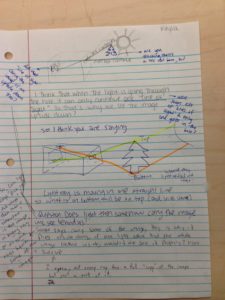 “Not only does peer review function to improve the author’s ideas and the exposition of those ideas, it also plays a critical role in creating and sustaining a scientific community. This iterative, ongoing feedback is how we define what problems need solving, the challenges present in their solution, and the methods that will be generative in solving those problems. Moreover, it defines who is interested in the problems, who the intellectual stakeholders are, and what it will take to convince them of our claims. That is, we co-create an audience for our work via iterative, ongoing peer review.” –Chapter 4, Composing Science
“Not only does peer review function to improve the author’s ideas and the exposition of those ideas, it also plays a critical role in creating and sustaining a scientific community. This iterative, ongoing feedback is how we define what problems need solving, the challenges present in their solution, and the methods that will be generative in solving those problems. Moreover, it defines who is interested in the problems, who the intellectual stakeholders are, and what it will take to convince them of our claims. That is, we co-create an audience for our work via iterative, ongoing peer review.” –Chapter 4, Composing Science
Click here for lesson plan: “Silent Science: Peer Feedback on Developing Ideas”
Take-Home Messages “Peer Review of Ongoing Work”
- In science, “the formal submission of a manuscript for peer review
is not the first stage at which it has been subjected to peer scrutiny” (Harnad, 1990, p. 342). Similarly, in our classes, peer review happens throughout the course. - Students need a chance to develop a language for feedback on scientific ideas. The instructor can model how to talk about ideas through written feedback and in conversations with students.
- Students need support as they learn to notice varying and competing ideas. Over time, pointing out competing ideas will help students see this as a valued practice.
- Students should be offered a variety of structures for giving and receiving peer feedback: orally through gallery walk discussions, on paper like silent science activities, online, and in table conversations in teams.
- As the ideas become more clear, the writing becomes more clear. Therefore, peer feedback in particular should focus more on scientific ideas than on sentence-level errors. Errors should be pointed out when they interfere with understanding ideas.
- Students need daily, iterative opportunities to give and receive feedback on scientific ideas, particularly before giving feedback on more high-stakes assignments. A major paper is hopefully not the first time they’ve commented on their peers’ ideas.
- One goal of peer feedback is to give students an audience for their ideas. Our class functions in similar ways to a research lab; their peers (nascent scientists) are a real audience.
